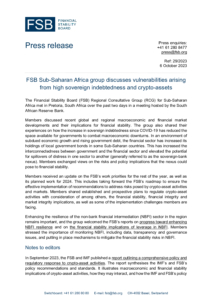Press enquiries:
+41 61 280 8477
[email protected]
Ref: 12/2024
The Financial Stability Board (FSB) Regional Consultative Group (RCG) for Sub-Saharan Africa met in Dakar, Senegal. The FSB RCG for Sub-Saharan Africa would like to thank Governor Jean-Claude Kassi Brou and the BCEAO for hosting the meeting for the first time.
The group received an update on the FSB’s work programme and discussed recent economic and financial market developments and vulnerabilities, including the increased exposure of banks to sovereign debt, that warranted closer monitoring. They also discussed how they could contribute to the FSB’s work on emerging market and developing economies.
A key focus for the FSB this year is enhancing cross-border payments. The day before the meeting, the RCG held a workshop with invited stakeholders to discuss progress being made under the G20 cross-border payments roadmap. The FSB’s work under the G20 Roadmap has moved to a new phase focused on implementation in relevant priority areas. The group discussed initiatives being undertaken in their jurisdictions and exchanged views on actions members could take to address the frictions underlying the challenges and to facilitate progress in meeting the G20 quantitative targets for enhancing cross-border payments.
Members discussed the potential benefits and risks of greater use of artificial intelligence (AI) by financial institutions, central banks, and regulators, as well as implications for financial stability. The FSB will also be delivering a stocktake of new developments in AI and their potential implications for financial stability to the Brazilian G20 Presidency later this year.
Members exchanged views on current challenges authorities face in addressing financial risks from climate change. This year, the FSB will focus on deepening its analysis of climate-related financial risks to financial stability and examining the relevance of transition plans for financial stability. Members discussed transition planning and how this was informing their assessments of climate-related financial risks.
Notes to editors
The FSB RCG for Sub-Saharan Africa meeting is co-chaired by Lesetja Kganyago, Governor, South African Reserve Bank, and Denny Kalyalya, Governor, Bank of Zambia. Membership includes financial authorities from Angola, Botswana, Ghana, Kenya, Mauritius, Namibia, Nigeria, South Africa, Tanzania, Uganda and Zambia as well as the Central Bank of West African States (BCEAO) and the Bank of Central African States (BEAC). Permanent observers include the Committee of Central Bank Governors of the Southern African Development Community and the East African Community.
The FSB has six Regional Consultative Groups, established under the FSB Charter, to bring together financial authorities from FSB member and non-member countries to exchange views on vulnerabilities affecting financial systems and on initiatives to promote financial stability.1 Typically, each Regional Consultative Group meets twice each year.
The FSB coordinates at the international level the work of national financial authorities and international standard-setting bodies and develops and promotes the implementation of effective regulatory, supervisory, and other financial sector policies in the interest of financial stability. It brings together national authorities responsible for financial stability in 24 countries and jurisdictions, international financial institutions, sector-specific international groupings of regulators and supervisors, and committees of central bank experts. The FSB also conducts outreach with approximately 70 other jurisdictions through its six Regional Consultative Groups.
The FSB is chaired by Klaas Knot, President of De Nederlandsche Bank. The FSB Secretariat is located in Basel, Switzerland and hosted by the Bank for International Settlements.
- The FSB Regional Consultative Groups cover the following regions: Americas, Asia, Commonwealth of Independent States, Europe, Middle East and North Africa, and Sub-Saharan Africa. [←]
